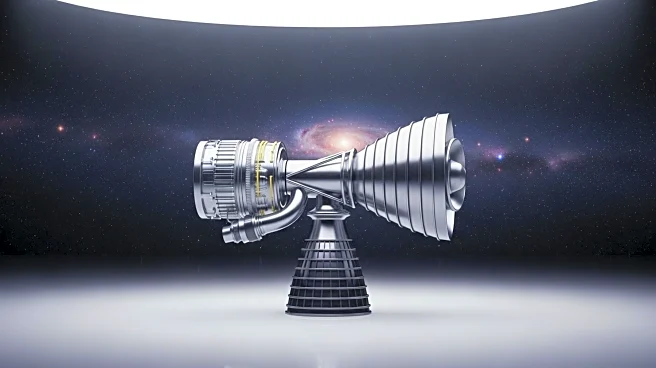What's Happening?
Russia's space agency, Roscosmos, is facing significant challenges in developing reliable rocket engines due to international sanctions and supply chain disruptions. The agency's reliance on outdated designs, such as the RD-180, has been exacerbated by the loss of international partnerships and domestic manufacturing hurdles. President Vladimir Putin has urged industry leaders to accelerate the development of booster rocket engines to maintain Russia's position as a leader in space technology. This push comes amid financial difficulties faced by Roscosmos's flagship enterprise, RSC Energia, which has announced a financial collapse due to multi-million-dollar debts. Despite these challenges, Russia achieved a symbolic milestone with the 300th launch to the International Space Station (ISS), highlighting its continued role in ISS operations.
Why It's Important?
The engine crisis at Roscosmos has broader implications for global space dynamics. Russia's struggles could impact its ability to compete with other space-faring nations, such as the United States and emerging players like India. The sanctions have limited access to advanced materials and components, potentially hindering Russia's ability to innovate and maintain its historical legacy in space exploration. The situation also underscores the geopolitical tensions affecting international collaborations in space, as Russia's wavering commitment to the ISS beyond 2028 could alter the landscape of space partnerships. The financial and technical challenges faced by Roscosmos may lead to a strategic shift towards domestic production and potential collaborations with non-Western partners.
What's Next?
Looking ahead, Roscosmos plans an ambitious launch schedule for 2025, including both manned and unmanned missions. However, the reliability of rocket engines remains a critical factor for success. President Putin's directives for advancements in rocket technology aim to counter global competition and preserve Russia's legacy in space exploration. The agency may explore collaborations with non-Western partners to overcome current challenges, although details on such partnerships remain scarce. The future of Russia's space activities hinges on its ability to innovate under constraints and navigate the financial restructuring necessary to sustain its operations.
Beyond the Headlines
The predicament faced by Roscosmos highlights the broader geopolitical shifts in space exploration. As Western firms like SpaceX continue to dominate with reusable technology, Russia's ability to innovate in isolation poses significant risks. The development of new engine technologies, such as the RD-171MV, could power future heavy-lift rockets, but scaling production amid economic strains remains daunting. The situation reflects the challenges of maintaining technological leadership in a rapidly evolving global space industry, where innovation and international collaboration are key to success.











